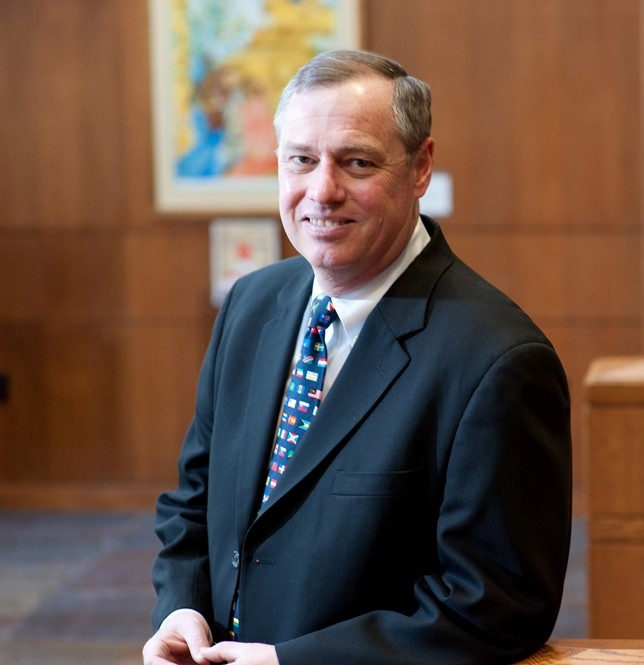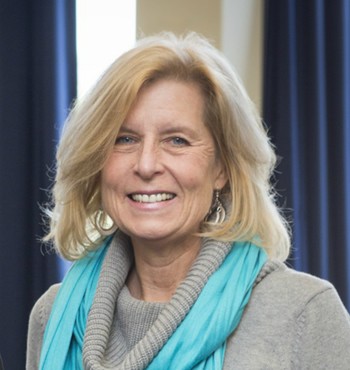Image by Alexandra_Koch from Pixabay
Boston College undergraduates had the opportunity to weigh in on President Trump’s controversial decision to withdraw the United States from the World Health Organization—just as if they were on the front lines of the conflict.
The 59 students took on the role of delegates from the United States, 13 other countries, and two non-governmental organizations as they expressed concern about Trump’s announcement before a special session on WHO’s COVID-19 response and institutional reform, as directed by the World Health Assembly, WHO’s governing body.

David Wirth (Suzi Camarata)
It wasn’t an excursion into virtual reality, but a simulation held as part of the Global Public Health Law class this fall, taught by BC Law Professor David Wirth, Professor of the Practice Mary Ann Chirba, and graduate teaching assistant Joseph Manning, a third-year BC Law student. Chirba acted as World Health Assembly co-chair, as did Wirth, who also was foreign minister and CEO, while Manning portrayed the secretariat.
The students—divided into four-member delegations representing nations ranging from Brazil to South Africa—and the faculty co-chairs were deadly serious in their negotiations around the truly grave, global issues that surround the COVID-19 pandemic, the International Health Regulations, or IHRs, that govern nations’ pandemic response, and the United States’ withdrawal from WHO.
Global Public Health Law is one of three required courses in the University’s 18-credit minor in Global Public Health and the Common Good, the first initiative of BC’s Schiller Institute for Integrated Science and Society. Distinctive features of the minor include its strong emphasis on the ethical, moral, and legal foundations of global public health, and its highly interdisciplinary faculty, drawn from the Morrissey College of Arts and Sciences, Connell School of Nursing, Lynch School of Education and Human Development, School of Theology and Ministry, BC School of Social Work, and Carroll School of Management, as well as BC Law.
“This simulated, multilateral negotiation provides a marvelous opportunity for our students to become immersed in the greatest public health emergency of our time,” said Philip J. Landrigan, M.D., director of the Global Public Health and the Common Good program. “It allows them to experience, under the tutelage of internationally respected experts, the complex, but critically important process of international negotiation. It also enables our students to realize that these apparently abstract deliberations have life-and-death consequences in the real world.”

Mary Ann Chirba (Photo by Caitlin Cunningham)
“Our students learn that the fine details of operative instruments have broad ramifications for public health, both domestically and globally,” added Chirba, who is the John C. Ford, S.J., Distinguished Scholar. “They also learn—the hard way—that however small a textual change might be, it most likely resulted from a great deal of ‘heavy lifting.’”
At the outset of the simulation, Wirth—in character as co-chair—explained the goal of the discussions was to establish “basic principles” ahead of more detailed elaboration of IHR texts, and described the negotiation process: three rounds of formal sessions over four weeks; communication between delegations “is encouraged,” he said, particularly among countries sharing geographic or political concerns and “where forming coalitions would be wise.”
The student delegates grasped Wirth’s unspoken message: Your country is in peril. You need to determine what positions you should you take, and what reforms in global health policy your delegation should propose to protect your citizens against COVID-19 and other pandemics.
Wirth is no stranger to international convenings and diplomatic language, having attended the 2018 Conference of the Parties to the U.N. Framework Convention on Climate Change in Poland as an official academic observer. In the next phase of the simulation, he invited delegates to make opening statements, each of which were based on the students’ research and intended to reflect their respective country’s actual status and concerns.
Like Wirth, the students had to speak in the style and format of international negotiations. Lynch School junior Ginny Alex, one of the delegates representing Antigua and Barbuda, proclaimed deep concern over the U.S. withdrawal, “and sincerely hope that the U.S. will reconsider its position…especially given that our economy and pandemic response [are] substantiated by wealthier nations.”
Alex’s fellow delegate, Morrissey College senior Julia Cardwell, said she and her colleagues hoped to represent “a consortium of similarly situated and like-minded Caribbean states, and as such, we hope to be in a position to articulate positions that otherwise might have little voice in the process.”
Closing the delegation’s remarks, Connell School senior Emily Aarons urged that the negotiation be “sympathetic to the capacities of all member states” while successful in “reducing the consequences of any future public health emergencies of international concern on global trade, travel, and the spread of infectious disease.”
“This simulated, multilateral negotiation provides a marvelous opportunity for our students to become immersed in the greatest public health emergency of our time. It allows them to experience, under the tutelage of internationally respected experts, the complex, but critically important process of international negotiation...[and] to realize that these apparently abstract deliberations have life-and-death consequences in the real world.”
After the 12 other delegations and representatives from the two NGOs, Doctors Without Borders and the Bill & Melinda Gates Foundation, each made their statements, Wirth welcomed amendments to the IHRs, edited in real time. This set the stage for two more rounds of negotiations that would take place in the weeks ahead. While the class turned to other domestic and global public health topics—including vaccines, opioids, and the Affordable Care Act’s fate before a reconfigured Supreme Court—the simulation continued outside the classroom: Delegations continued to consult among themselves, engaged with other groups, and met with the chairs and secretariat as they pursued compromise consensus.
In an interview, Wirth lauded the class’ work: “After completing this exercise, our students are prepared to go out and negotiate for the State Department or another foreign ministry. They have done at least as good a job as is typical in actual multilateral practice—and probably better!”
“We have an ambitious agenda,” said Chirba, adding that studying public health issues in the midst of a global pandemic presents a special challenge. Through the simulation, which she noted had given the undergrads a “much-savored opportunity” to work together, “our students develop professional skills, deepen personal insight, and realize firsthand that with persistence, mutual respect, and commonality of purpose, we truly can solve complex problems.”
Phil Gloudemans | University Communications | December 2020




